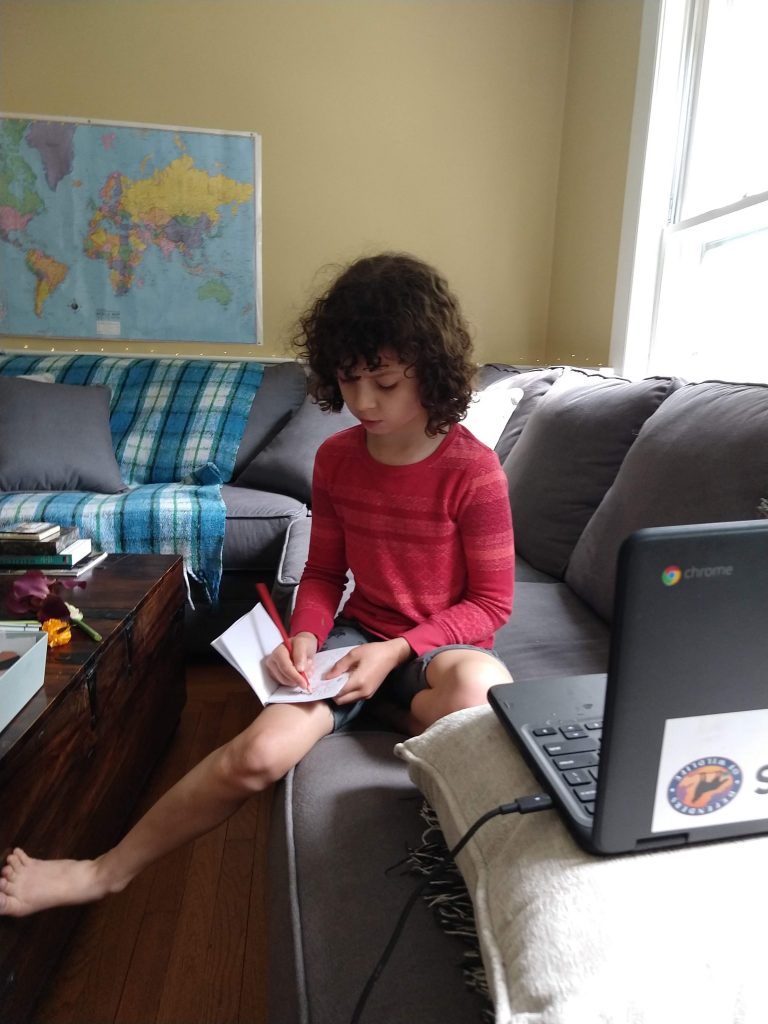
Online Falcons
Some learning needs groups, and we can learn a lot from peers in other places. This student-centered community brings learners from multiple locations together in one online space to build their reading, writing, problem solving, artistic, and math/science skills through multilayered questions like “What is learning?” “Is math logical?” and “Why does my neighborhood look the way it does today?” Collaborative discussions allow students to learn from one another’s experiences, and the online format builds healthy 21st-century communication skills from the standpoint that technology is a tool, not a destination.
Falcons family, on online learning:
Our family has appreciated the flexibility of online learning. Practical benefits include no lunches to pack, no colds, and no commuting. We love that our child can engage with a community and sphere of her own in such a convenient way. Seeing the creativity and facility with which kids have adapted their learning, play, and collaborations in this context has been inspiring. We’ve been pleasantly surprised by how much is not only possible online but even enhanced! This modality jump-started our child’s reading ability, allowed for seeing friends who otherwise would not have time or proximity to get together, honed filmmaking and other visual arts skills, enabled a wide variety of inventive games, and sharpened social awareness and inclusion. In some ways, learning remotely contributes to the class in ways that learning on-site cannot, such as when students show each other the progress of birds building nests in their yards in spring, showing off snow forts, ongoing engineering projects, and other parts of their lives that allow them to integrate more aspects of themselves as individuals. Of course, this engaging, enriching experience is not inevitable when programming occurs online; it’s the result of intentional steps and structures that foster it. Anna and the Falcons team have extraordinary background and vision that make this community hum along so well, and that make their emergent curriculum so effective. Their community-building and pedagogical talents and skills set Falcons apart.
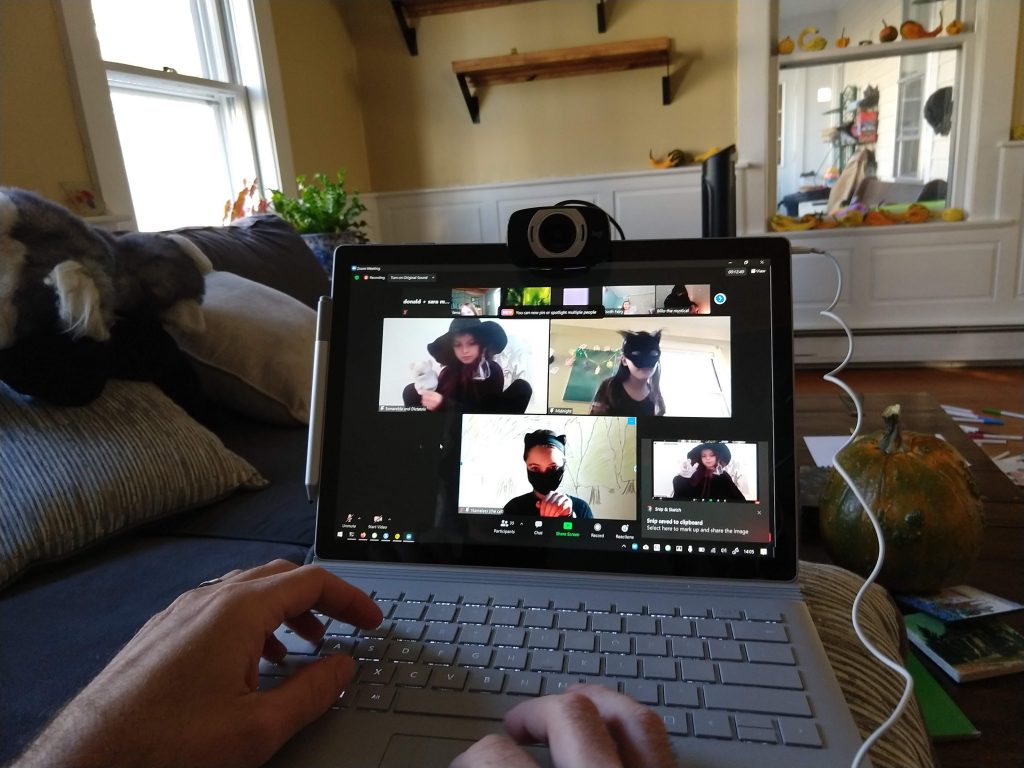
HOW DOES ONLINE FALCONS WORK?
Just as in-person school can take a myriad of different forms – from straight rows of desks to forest kindergartens – so, too, can distance programs. Our online program translates the student-empowerment, supported spontaneity, joy, and creativity of a student-centered classroom into a community that can be accessed from anywhere, either as a family’s primary homeschooling support or in tandem with the in-person classroom in Northampton MA or other programs. Students attend via Zoom to enjoy hands-on learning at home while simultaneously partaking in a vibrant learning community, and maintain an “Online Classroom” together in google drive where they build and curate the learning resources that they use in common. Class days provide a combination of hands-on learning, teamwork, and social time with technology as the means, but the real world and one another as the ends.
WHAT DOES A TYPICAL ONLINE FALCONS DAY LOOK LIKE?
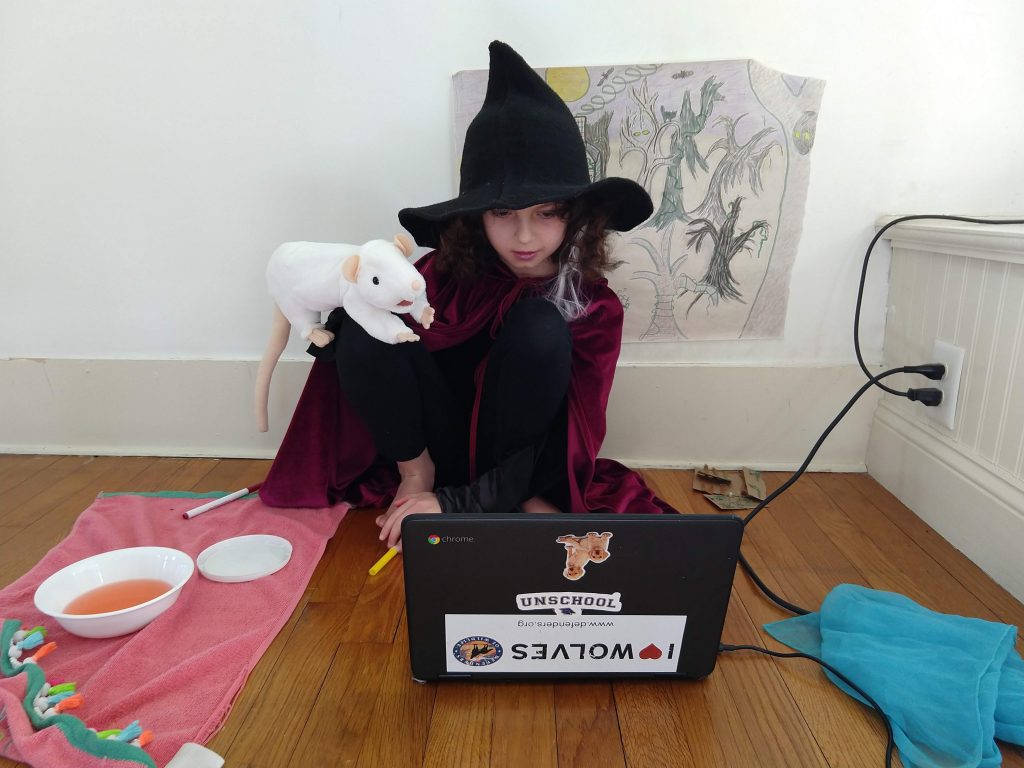
The Integralis pedagogy involves students as co-creators in the methods and traditions of their classes, meaning that our schedules have emerged over months or years of experimentation and exploration together as a student/teacher community. Currently the daily routine for the Online Falcons is as follows because it has served the community best, and it is likely to continue to grow and change as the students do:
Sharing Time: A version of Show and Tell raised to a high art form by the students, this allows us all to check in with one another at the start of each day, to see (and admire!) what students have been working on outside of class, and to practice public speaking and presentation skills so organically that students seldom notice they are doing so. Students often share their Suggestions (see end of day) work here, and teachers may slip in a lesson that follows up on a concept from a previous day as part of their Shares: this models expanding class topics to daily life and cultivating a learning-rich lifestyle.
Set-Up: As in in-person Falcons, online students build and maintain their learning spaces and curate their tools and materials. Setting and cleaning these up every day keeps the work spaces fresh, accommodates families who may not want a work space up all the time, and provides a chance to move around to music at the start of the day.
Morning Challenge: Developed largely by the students, Morning Challenge is exactly what it sounds like: a challenge issued by a teacher or student asking Falcons to solve a problem or meet a need creatively. Some examples include “Make a journal any way that works,” “Create a way to keep track of the days in April,” “Design a standardized way of measuring wind,” or “plan the schedule for visiting day.” Students work alone or together depending on the project and the results often become fixtures in their tool sheds or as new additions to the daily schedule going forward.
Problem of the Day: All subjects, no matter their topic, have a mathematical dimension, and Problem of the Day ensures students explore it while also building their confidence approaching problems that they may not have seen before, accessing help from teachers and one another as needed. Examples include calculating how far apart events are in time (in years, decades, centuries and generations,) balancing chemical equations, and building scale models.
Task Time: Our classes are designed around the understanding that every student starts in a different place and learns at a different rate, and Tasks – interactive activities that exercise a particular skill – allow each student to start where they are and build specific skills from there rather than keeping pace with anyone else, while still receiving the benefits of learning in community. Examples include creating maps, writing and revising sentences, paragraphs, or essays (depending on level), seeking sources and taking research notes, shading a drawing of an egg, or any other still the student demonstrates that they would benefit from exercising. Students also often design tasks for themselves or one another, or dovetail Task Time with tutoring assignments if they are enrolled in tutoring as well.
Gathering: This all-class meeting provides us with an experiential civics curriculum. Students come together to reflect on living in community, practice their discussion and group problem solving skills, and explore together. In Gathering we respond to the world around us, whether in our hearts, in our community, or on the global scale, and connect it to our studies and experiences. Falcons have been known to time travel, write plays, embody atoms, and reconstruct the circulatory system during Gathering, and it forms the core of our community life together.
Lunch and Recess: At this time we ask students to get off screen, stretch their bodies and their eyes, make lunch, rest what needs resting and exercise what needs use – and then tell us about their adventures when they return. This creates a balance of independence and social time – as well as a good solid screen break – and mirrors the “live and share” rhythm that permeates the wider learning week.
Afternoon Lesson and Book Study: One of the great gifts of online learning is the power it gives us to all interact with a text together as a community, which forms the main focus of our afternoons. Online, students can mark up a text collaboratively, help one another sound out words, go running after definitions, instigate a heated discussion, spot a connection, add illustrations, and divide up the dialogue like the script of a play – often complete with costumes and voices, too! Books form the backbone of learning, and we choose stories that send tendrils into dozens of topics – often through their failings as well as their beauty. Imperfect books help us name the injustices behind them for the sake of making the world more whole. They allow us a springboard to investigate alternative resources and spark discussions on the power stories have, the harm and good they can cause, the world we want to see, and what we need to do to get there. Among other topics, we have studied botany, ornithology, colonialism, and grief via The Secret Garden, genetics, linguistics, geology, and Wampanoag history through Show Me a Sign, and Reconstruction, molasses, silk, steam engines, and the power of changing our minds through Sugar. Our books guide us, shake us, spark interest in topics we never knew existed, send us ricocheting down research rabbit holes (sometimes with real rabbits in them!) and bind us together into a team of inquirers eagerly awaiting the next discovery. And, when we are tired from a long day of other activities, books also let us flop down and rest while still soaring into new unknowns.
Suggestions: One of the more glorious student inventions, Suggestions draws students into homework habits and a learning-rich lifestyle on their own terms. Each day, students think back over all we have covered together and name what they want to continue thinking about, learning, or working with and make a list together of suggested activities to do before next class. When we return next day, they report on what they did, using Falcons to enrich their non-class lives, and their non-class activities to enrich their class time. This cultivates a culture of lived learning in our community, and also provides a useful resource for parents seeking homeschool assignments.
Complement Circle: Even more magical than the Suggestions list, students decided in the winter of 2021 that they wanted to end each day telling one another how much they matter, so they do. Students share compliments, thank yous, and wishes for one another, sending each member of the community off into the afternoon knowing that they are loved.
CAN STUDENTS HAVE A MEANINGFUL EXPERIENCE ONLINE?
Absolutely! Here is what our students have to say about that:
“Yes! it is amazing, and no less amazing than in person.”
“Thumbs up!”
“Online Falcons is still just as fun and funny as it was in person.”
“I’m glad that we’re able to do Falcons no matter what else is going on, plus we can get here as early as we want and we don’t have to take the time to drive anywhere.”
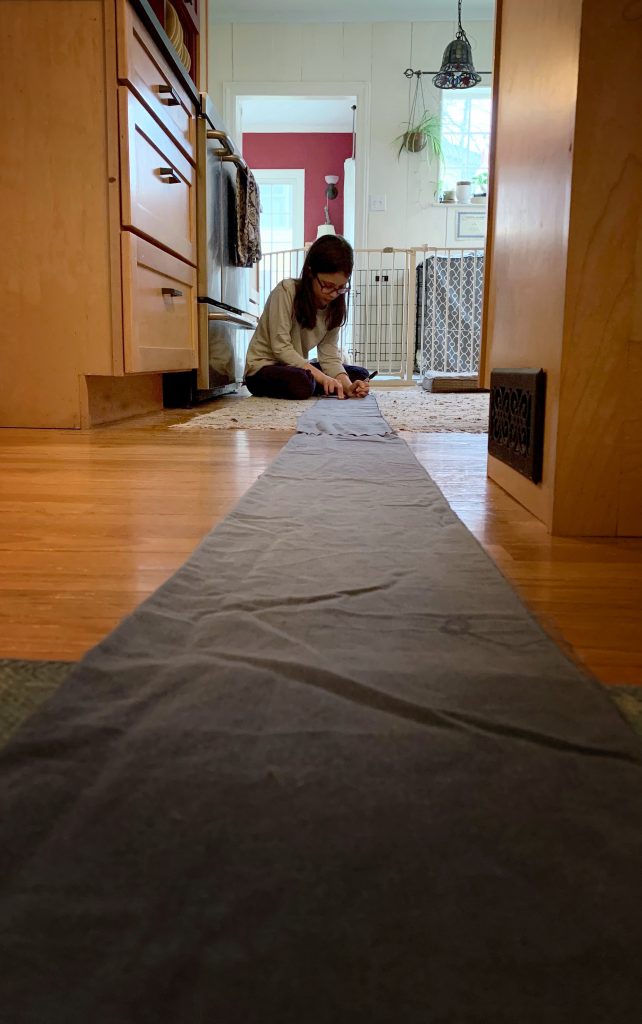
WHAT ARE THE ADVANTAGES OF ONLINE SCHOOLING?
As with all forms of schooling, every child is different – and so is every online program! – so what makes a program work for a child is often as individual as the child themselves. Over time, though, we have seen several consistent benefits emerge, including
-Location: an online learning community can welcome students from anywhere, making it very helpful for students who do not live near an active homeschooling community or want a wider variety of contacts than their location offers. It has also been helpful for families who travel, live in more than one location, or face logistical challenges with commuting or custody: the fact that students can attend from anywhere provides continuity regardless or location.
-Accommodation: Not all students thrive in all environments, but many thrive at home or in situations where they have control of their surroundings. Online students create their own learning spaces to meet their needs, and attend school from the place most meant for them – their homes – anchoring them solidly in where they thrive and merging the methods they use to do so with community life. We bring many years experience working with disability and accommodation, both in the classroom and online, and work extensively with families and students to create the learning set-up that works best for them.
-Anxiety: Studies show record numbers of students struggling with anxiety, even before the pandemic, and speculations suggest that the number has grown significantly since 2020. The ability to access school from a place one feels safe, surrounded by objects, pets, and people one uses for comfort has been a game-changer for many of our students, and we have seen them blossom as a result.
-COVID-19: Germs can’t pass through screens, making the online learning format perhaps the most contagion-safe option available, but infection risk isn’t the only toll that COVID has taken on students: disruption, or the constant looming possibility of disruption, task students’ energies as well, making the durability and consistency of an online learning community one of its greatest benefits. Falcons students have continued their schooling completely uninterrupted since the creation of the online program in March 2020, their days remaining stable and predictable through the vicissitudes of COVID.
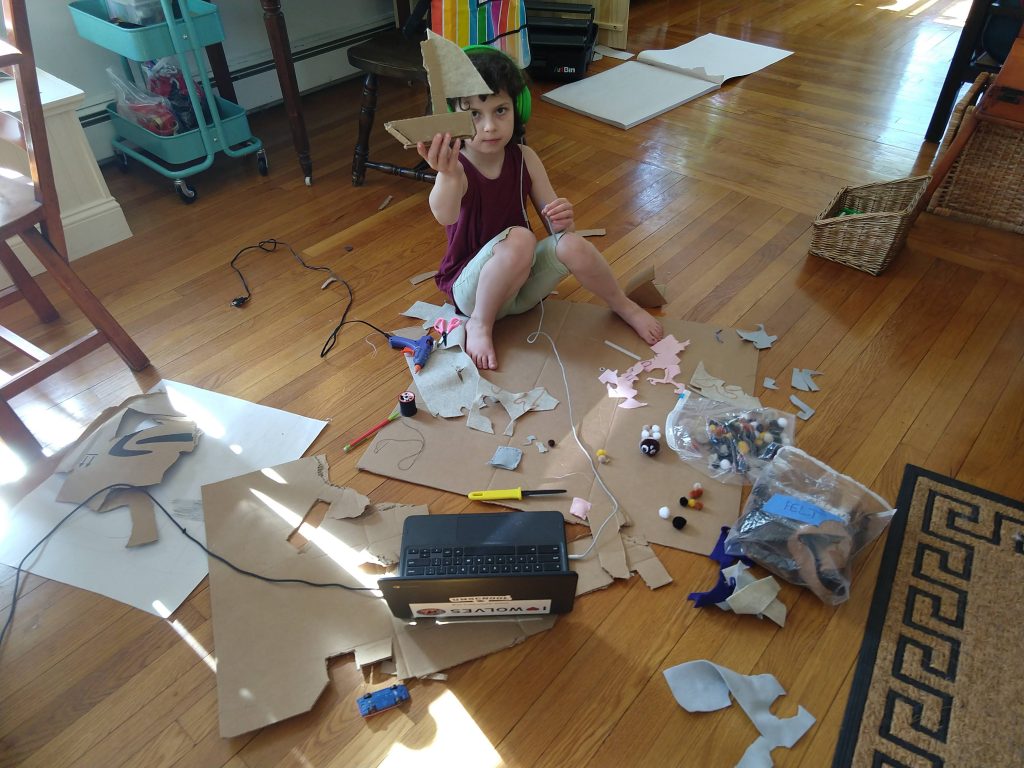
THAT’S A LOT OF SCREEN TIME…
It would be if the students spent it all staring at a screen, but Falcons don’t. Just as students in the classroom spend their day in several different configurations – sometimes working in groups, sometimes exploring independently, and sometimes sitting and listening – so, too, do the Online Falcons, with the same emphasis on hands-on learning. We divide our day into different types of time. During many of these we ask students to focus on materials in the real world. During Gathering and Sharing they use the screen to look at one another, at puppet shows, pictures, or science demonstrations, and they sometimes team up to write together. Students get off screens for lunch and recess and share their adventures or creations when they return before spending most of the after lunch time flopped down listening to a book with eyes on handwork, drawing, or notes.
During much of the day we treat the screens like a talking picture frame, using it to keep us connected while we work, but not as the focal point. As with in-person Falcons, online students curate tool sheds and materials boxes and do much of their learning with tactile objects, using their screens to share ideas as they go.
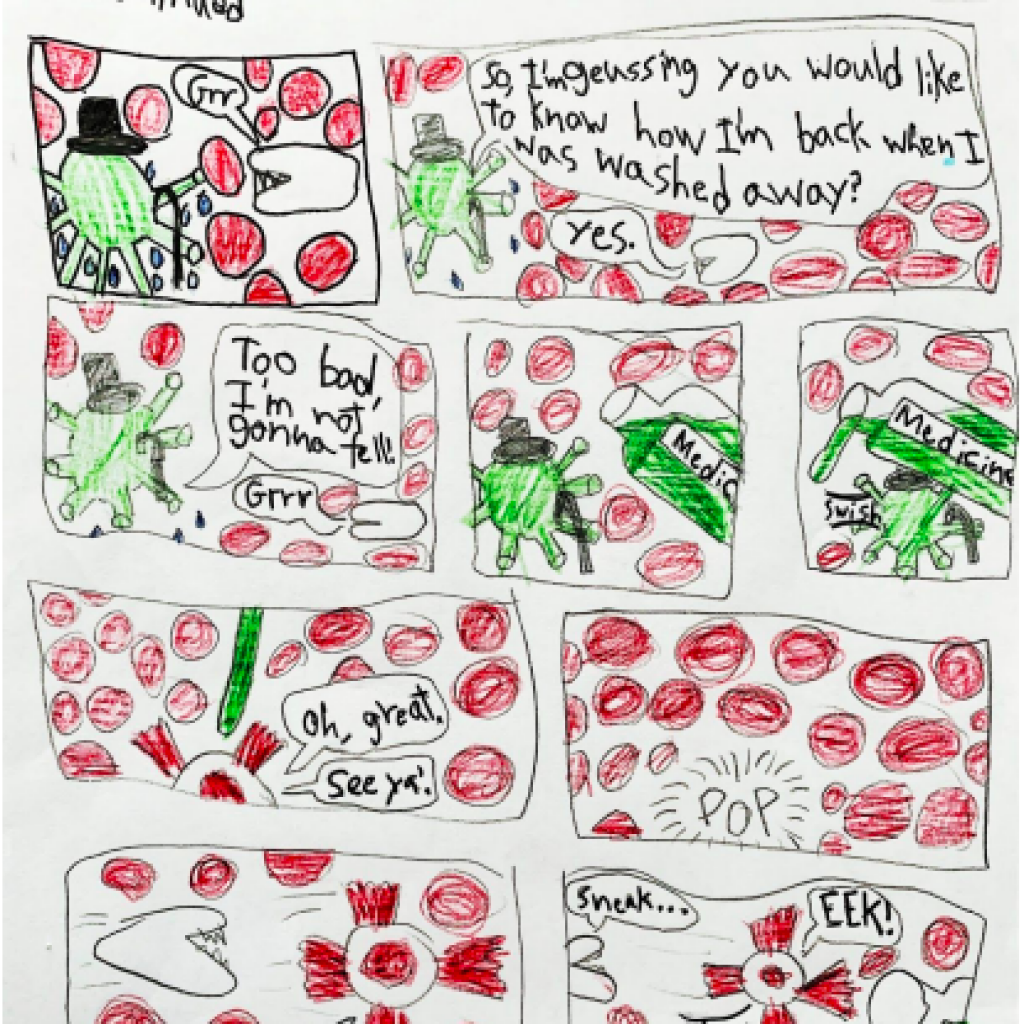
LOGISTICS
Schedule: Online Falcons meets on Tuesdays and Thursdays from 9:30am-2:30 am Eastern Standard Time, with an adjusted schedule available for those in Pacific Time or further west. We follow a September-June school year with a traditional winter break. Spring break usually coincides with Passover and/or Easter and the first Thursdays of every month are set aside for guest teachers or experiments in independent learning.
Cost: The cost for Online Falcons is $3,800 for the year, split into ten payments of $380 each, due on the first of every month. Sibling discounts are available.
BUT WHAT DO WE DO WITH THE REST OF THE WEEK?
Families looking for educational support on Mondays, Wednesdays, and Fridays are encouraged to explore our tutoring and homeschool support options, or the in-person classroom if in Maine. All of our offerings are coordinated with one another, making them an easy to way to build a multifaceted, personalized homeschool experience. Please see our “Other Offerings” page for more information.
